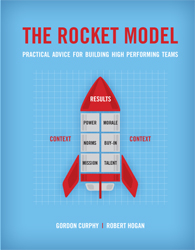 Perhaps one of the most overlooked yet most important actions of team functioning is setting team goals. Far too many teams have poorly defined goals or none at all. The goals of a group or team should determine:
Perhaps one of the most overlooked yet most important actions of team functioning is setting team goals. Far too many teams have poorly defined goals or none at all. The goals of a group or team should determine:
- Size, skill requirements, roles and responsibilities (Talent)
- How often it meets, makes decisions and communicates (Norms)
- The level of engagement needed (Buy-In)
- Resource needs (Power)
- Espirit de corps and conflict resolution (Morale)
- How to win (Results)
Team and group goals define what is to be accomplished, when it needs to be accomplished, and how to know when it is accomplished. Therefore leaders must spend time developing well-defined goals and metrics for their groups and teams if they want to succeed.
Goals also determine whether members operate as a group or a team. If members do not work together, or share common identities or fates, then they need to operate as a group. Conversely, they may need to operate as a team if the members’ fates are tied to the accomplishment of the same goal and collaboration is necessary for success. Having well-defined goals, metrics, and benchmarks will improve both team and group performance because everyone will know what is required.
There are several other aspects of team goals worth noting. First, team goals drive team behavior; individual goals drive individual behavior. Leaders should not expect direct reports to work collaboratively if all the goals and rewards are based on individual performance. Second, team goals should be measurable and include a mix of leading and lagging indicators. Finally, team goals also need to include both internal and external benchmarks. Teams that only measure themselves against past performance may look like they are winning all the battles but, in fact, may be losing the war with competitors.
By Gordon Curphy
Curphy Consulting Corporation
Guest blogger and co-author of The Rocket Model